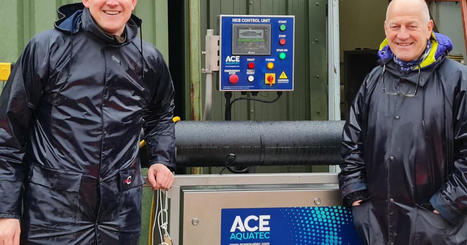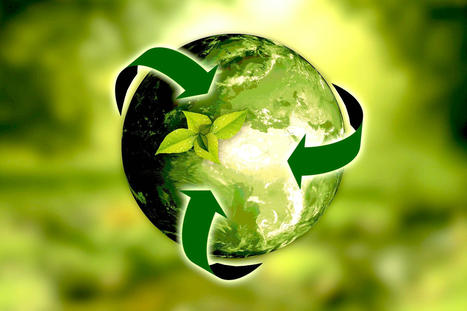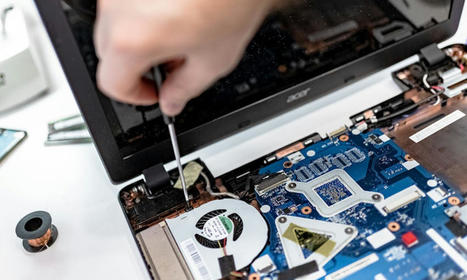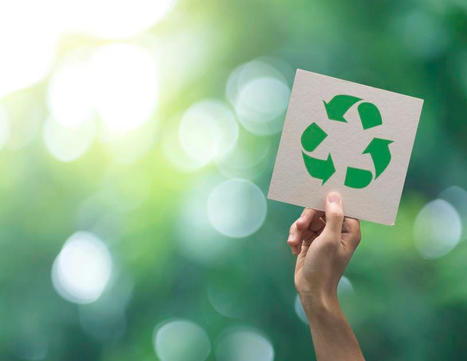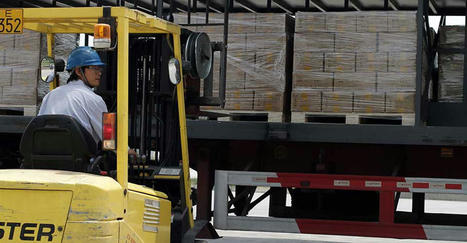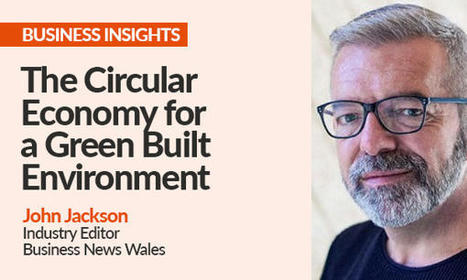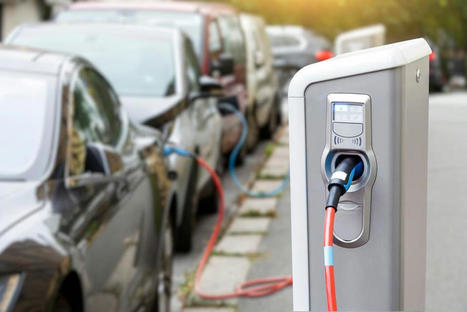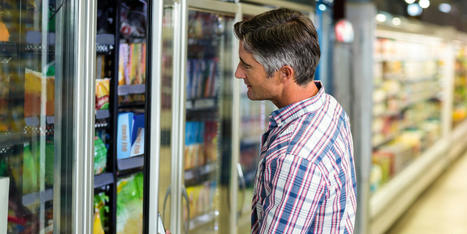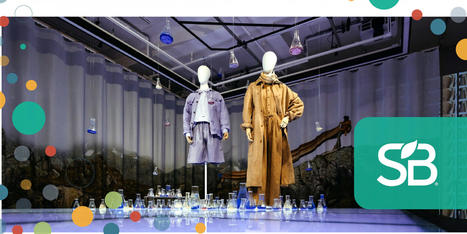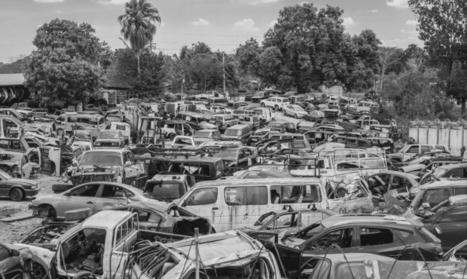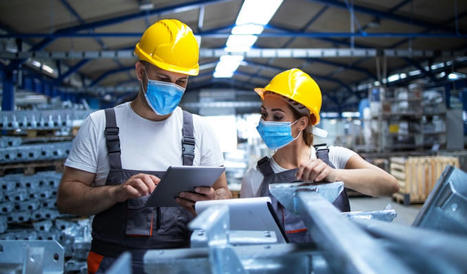 Your new post is loading...
 Your new post is loading...
A collaboration between aquaculture technology specialists Ace Aquatec and start-up Tiny Fish aims to advance the Scottish salmon industry’s circular economy by helping the sector gain access to new premium food markets for its smallest fish.
Scottish salmon farms have an approximate monthly survival rate of 97 to 99 percent throughout their lifecycle, with the fish lost each month commonly being composted. However, through their new collaboration, Ace Aquatec and Tiny Fish hope to alter this fate, culling smaller fish and marketing them as a premium food product.
Via EcoVadis
Despite the common belief that data center operations and the cloud generate information technology’s most significant environmental impacts, the embodied carbon of endpoint devices accounts for nearly half of overall IT greenhouse gas emissions in most enterprises.
As digital business accelerates, the use of corporate endpoints and peripherals continues to grow exponentially. Consequently, managing the environmental sustainability of end-user equipment is becoming a core responsibility and priority for IT leaders.
Yet many of them don’t realize that the decisions they make at every step of the device life cycle have a significant impact on IT sustainability. In addition to supporting corporate environmental, social and governance goals, strategic sustainability decisions can also provide benefits such as cost savings, modernization and infrastructure resilience.
The key to harnessing such benefits is to use the circular economy as a guiding framework for device sustainability. Here are the steps that IT leaders can take to rationalize, retain and restructure the use of devices continually, from procurement though disposal, in a way that equally serves the planet, engages employees and supports the business.
Via EcoVadis
BT has announced a new programme aimed at reducing business customers’ e-waste by recycling end-of-life equipment and helping them achieve their targets for a circular economy.
BT says its new service with Cisco will reduce e-waste and support a more sustainable world. It’s the latest step in BT Group’s Manifesto pledge to move to circular products, networks and operations by 2030, and then extend this across its supply chain by 2040.
The new programme comes as organisations around the world are transforming their network and IT infrastructure to support the latest multi-cloud deployments, BT says. As part of this transformation, BT continues that its environmental specialists will work with customers to better understand and map the role of sustainability in a digital world.
As part of the service, replaced or decommissioned electronic equipment from a customer’s network will be shipped back to Cisco to be “responsibly” reused or recycled through its takeback and reuse programme. BT says up to 99.9% of what is returned will be reused or recycled.
Creating a more sustainable, circular economy, where we prioritise dematerialisation and avoid equipment going to landfill, is vital.
Via EcoVadis
“Investing in a circular economy approach must become an integral part of how companies run their supply chain,” said Stephen Jamieson, Global Head of Circular Economy Solutions at SAP. “As regulations become more widespread and investors increasingly favour circular business models, companies explore new ways to retain the value of their products.”
Circular economy as a competitive factor
The focus on a circular economy has clear financial benefits. Research by the Ellen MacArthur Foundation suggests 45 percent of CO2 emissions can be tackled by transforming the way goods are made and used. In times of growing CO2 prices, the circularity of products becomes a strong competitive factor and putting value on waste generates significant new revenue. Accenture estimates $25 trillion could be up for grabs by 2050.
In addition, circular manufacturing enables companies to:
- Retain and recapture the value inherent in the original equipment manufacturer’s existing products
- Reduce demand for new materials 50 to 98 percent
- Reduce energy consumption over new manufacturing 55 to 90 percent
A prominent example is Apple, whose products contain nearly 20 percent recycled materials such as gold, tungsten, rare earth elements and cobalt. These materials are also used in iPhone batteries and the plating of the main logic board or camera wires. Philips refurbishes medical imaging equipment like CT scanners, upgrades it and sells it again. Hospitals can trade-in their old equipment for a discount on new systems.
Via EcoVadis
Billions of tonnes of materials are used to produce goods and then thrown away. With consumption and inflation constantly on the rise, Switzerland could do more to transition to a circular economy.
Produce, consume and throw away. Until now, this has been the linear model of economy dominating all developed countries, including Switzerland.
Of the 100 billion tonnes of materials consumed in the world, only 9% are reused. In a circular economy more materials would be reintroduced into the supply chain, closing the 'circle of life' of the products we consume. This concept is based on the idea of creating value by repairing, reusing and recycling existing materials and products for as long as possible.
Via EcoVadis
“As the first plastic tax to be implemented globally, the UK PPT is a harbinger of the worldwide movement reinforcing the polluter pays principle alongside extended producer responsibility,” said Stephen Jamieson, global head of circular economy solutions at SAP. “By disincentivising the use of unsustainable materials, the government is at the same time incentivising the market value of recyclable plastic, fostering a sustainable circular economy that will have global repercussions.”
Via EcoVadis
Today’s supply chains were designed to optimize efficiency and speed while minimizing costs. Unfortunately, the COVID-19 pandemic exposed crucial weaknesses in the paradigm. Resource shortages, product scarcity and end-to-end traceability gaps have caused system breakdowns and rampant distribution delays. Transformation is needed to create a more forgiving, sustainable supply chain that can better navigate future challenges.
Via EcoVadis
A recent survey by risk management experts, DNV, suggests consumer knowledge of circular economy is growing and their attitude towards it is generally positive. However, trust in companies requires ‘strengthening’ while more ‘innovation and legislation’ is needed to drive increased engagement and action, it says.
Via EcoVadis
Summary:
For over 15 years I have been preaching need to develop technology that grow the inclusive economy while ensuring the environment is well protected.
The world needs to start addressing factors that putting both private and public sector assets at risks due to climate change. Climate is not new, but how both the private and public sector better protect themselves from climate change needs to be step up over the next few years.
Via EcoVadis
With a supply chain that extends to over 60 countries, Dow views supply chain sustainability as a key enabler of our overall corporate sustainability strategy. That’s why we have made incorporating circular solutions into our supply chain a priority. By identifying and implementing ways to cut waste and save resources, we can extend the life cycle of the materials and work toward a low-carbon future.
This cannot be done alone. Such efforts require collaboration with our suppliers, customers and logistics service providers.
Via EcoVadis
In this article, John Jackson discusses the importance and value of creating a green circular economy, bringing attention to how businesses may need to consider adapting current processes into becoming more environmentally friendly. As well as this, John introduces the use of recycled or reconditioned products and materials as a considerable method that could significantly contribute towards a business's decarbonisation strategy.
Via EcoVadis
Endesa has launched the first circular economy academy in Spain to prepare its workforce and operations with the changing economic models that are resulting from the incorporation of sustainability in business cases.
Via EcoVadis
The Coca-Cola Company, Colgate-Palmolive Company and Unilever recently announced their joint efforts with the Anheuser-Busch InBev (AB InBev) 100+ Accelerator to fund and pilot sustainable innovation in supply chains.
Launched in 2018, the 100+ Accelerator is a global incubator program that works to solve supply chain challenges across water stewardship, circular economy, sustainable agriculture and climate action. Over the last two years, the program has accelerated 36 companies in 16 countries. The 100+ Accelerator offers size and scale to passionate entrepreneurs to help bring their solutions to market faster. These startups have raised more than $200 million and are scaling globally to achieve the program’s mission: to accelerate the world’s shift toward sustainable solutions and to do business the right way, not the easy way.
Via EcoVadis
|
As electric vehicles (EVs) supplant gas-fueled cars, companies across the automobile supply chain are collaborating to create the circular economy that will reduce carbon emissions and lead to sustainable business models. Suppliers are already co-innovating across boundary-breaking ecosystems, while as-a-service offerings are delighting drivers and business partners with new experiences.
Via EcoVadis
Stellantis will look to upgrade its medium-term target for the minimum percentage of recycled material in its vehicles from 35 percent, the carmaker's Senior Vice President Global Circular Economy Alison Jones said.
In its business plan, Stellantis has set a goal to boost revenues of its recycling business ten-fold to over 2 billion euros ($1.9 billion) by 2030. It also aims to quadruple revenues from extended-life parts and services.
"We talk about having a minimum target of 35 percent of recycled materials in our vehicles, it will vary by vehicles," Jones said on Tuesday whilw presenting Stellantis's Circular Economy business.
"Of course we will look to increase that, because we want to make sure we take more material and put it back in our vehicles going forward," Jones said, without specifying what the percentage might rise to.
Jones said the project -- based on "reman," "repair," "reuse" and "recycle" -- would help the group meet its carbon net zero target set for 2038.
It will also help the automaker to keep prices lower as the shift to electrification often means more expensive vehicles, and cope with potential prolonged shortages of raw materials in its supply chain.
Stellantis CEO Carlos Tavares has said scarcity of raw materials will continue in the next decade, adding it is a key task for the carmaker to extend the life of materials it uses.
Via EcoVadis
Circular from the start
Startups have the opportunity to build businesses based around the circular economy from the start of their lifecycle.
“Startups have the ability to build their businesses from scratch, truly disrupt the status quo and educate both consumers and businesses, in the process”
“Startups play a crucial role in helping the economy transition to the circular economy, because they don’t have the red tape or consumer expectations big tech does,” says Thibaud Hug De Larauze, cofounder and CEO of scaleup Back Market. “They have the ability to build their businesses from scratch, truly disrupt the status quo, and educate both consumers and businesses in the process.”
Back Market, founded in 2014, says it’s now the globe’s biggest online marketplace for refurbished devices and appliances, with over 6m users and over €1bn raised.
According to figures cited by De Larauze, as much as 70% of existing toxic waste is due to disposed electronics, while only 12.5% is recycled.
De Larauze says big tech is always looking for the new — offering expensive products that they want consumers to purchase on a yearly, or biennial basis. That creates two problems for customers: affordability and impact on the environment.
“Refurbished technology can solve both of these problems. Not only are renewed devices much more affordable, they are key to creating a circular economy and drastically reducing the impact of technology on the environment,” says De Laurauze.
This impact of technology and electronic devices can also be mitigated by renting equipment rather than purchasing it. This is particularly useful for smaller businesses and startups that may not know what equipment they need as they begin their journey.
Via EcoVadis
The voluntary guidelines, published by the BRC, outline the steps retailers can take to adhere to circular economy principles. By following this circular model, the BRC says retailers will further the progress they have already made to lengthen the lifecycle of the products they buy.
As part of the guidelines, it explains clothing, footwear, homeware textiles, and other items, retailers can promote resale markets and platforms; use hire and rental subscription services; and offer product swaps, upcycling and repair schemes, instead of throwing away items.
The guidelines also emphasise the importance of quality checks, which “clearly informs” the customer of the item’s condition. They also clarify that its aim is not to promote the circulation of perfect items, but rather to circulate all items, “safe in the knowledge” that both buyer and seller have the same level of information and expectation of their condition.
Retailers recognise the role they can play in helping their customers shop in more environmentally friendly ways.
The UK trade association explains that its long-term goal is to limit, and ultimately end, the sending of items to landfill unnecessarily and to keep them in circulation for longer so that they can be used and loved by more people.
The BRC says it is already working with retailers on their journey to Net Zero through their Climate Action Roadmap. Supported by over 80 major retailers, it is the Retail Industry’s commitment to reduce industry and supply chain carbon emissions to zero by 2040.
Chief Executive of the BRC, Helen Dickinson OBE, said: “We are delighted to launch our first voluntary Guideline on second-hand and preloved items. With more people looking for ways to shop sustainably, particularly as the cost of living rises, the sale of second-hand items in-store and online can encourage sustainable behaviours at affordable prices and take us one step further towards a circular economy.
“Retailers recognise the role they can play in helping their customers shop in more environmentally friendly ways, and we hope that this Guideline will help many on their sustainability journey.”
Via EcoVadis
New research by the University of Exeter and Philips UK&I urges the NHS and its suppliers to systemically adopt circular economy (CE) practices in order to meet the NHS’s net zero by 2040 target and improve patient care.
The research follows a key commitment made by the Government to achieve a net zero NHS by 2040, a UK-led COP26 Health Programme and £280 million of funding to decarbonise the NHS estate between now and 2025.
The NHS’ Carbon Footprint and Carbon Footprint Plus (which includes the supplier footprint) are currently 6.1 MtCO2e and 24.9MtCO2e per year respectively.
Suppliers to the NHS are responsible for 62% of all NHS emissions. To achieve the target set by NHS Carbon Footprint Plus, the health service must achieve 8% CAGR reductions in carbon emissions from 2020 to 2036, a rate far higher than the 1% historical average.
Via EcoVadis
“As the first plastic tax to be implemented globally, the UK PPT is a harbinger of the worldwide movement reinforcing the polluter pays principle alongside extended producer responsibility,” said Stephen Jamieson, global head of circular economy solutions at SAP. “By disincentivising the use of unsustainable materials, the government is at the same time incentivising the market value of recyclable plastic, fostering a sustainable circular economy that will have global repercussions.”
Via EcoVadis
PET plastics producer Indorama Ventures has announced a partnership with chemical recycling specialist Carbios as it looks to scale the company’s proprietary technology at the former’s site in Longlaville, France.
The goal is to establish the world’s first industrial-scale enzymatic recycling plant for plastics and textiles, which is expected to cost more than €200 million (US$225m) and boast a processing capacity of more than 50,000 tonnes of post-consumer PET per annum.
“With this first medium-sized plant, we want to become the world reference for the circular economy of plastics and textiles,” noted Carbios’ chief executive, Emmanuel Ladent. “This plant will pave the way towards international commercial and industrial deployment.”
Via EcoVadis
A recent survey by risk management experts, DNV, suggests consumer knowledge of circular economy is growing and their attitude towards it is generally positive. However, trust in companies requires ‘strengthening’ while more ‘innovation and legislation’ is needed to drive increased engagement and action, it says.
Via EcoVadis
A new report — co-authored by Fashion for Good and the Apparel Impact Institute (Aii) and sponsored by HSBC — for the first time charts a trajectory for the industry to meet the net-zero ambition, mapping the integral levers across existing solutions such as renewable energy, and emerging innovations such as next-generation materials and circular and other end-of-life solutions for textiles. Estimating an investment opportunity of $1 trillion to finance the transition, the report breaks down the funding needed by solution category and identifies the types of funders best placed to take advantage of the opportunity and benefit from the positive returns.
Via EcoVadis
Businesses must adopt circular economy models to meet consumer demands and mitigate future supply chain risk. Consumers are becoming more discerning and more demanding of businesses to be responsible. As a result, they’re pivoting towards companies that engage in circular practices.
Via EcoVadis
When automobiles are at the end of their life, as much as 20% of their materials — referred to as automotive shredder residue (ASR) — currently end up in landfills, according to Eastman. Now, the specialty materials company is partnering on a feasibility study in hopes of demonstrating that ASR can be recycled back into automotive parts to further circularity in the automotive supply chain.
Via EcoVadis
Earth day consistently serves as a reminder to reflect on the most impactful approaches to sustainability. This year is no exception given society’s recovery from a pandemic that has made us focus on building a better future, and an acceleration towards net-zero carbon commitments from businesses and communities worldwide. New strides are being made in the circular economy and how it applies to different sectors, including capital equipment – high-value products designed, built, and acquired to last. Ranging from MRI machines to wind turbines to data servers, the range of industries and products represented in the sector are as diverse as the sustainability opportunities surrounding it.
Circularity in capital equipment or heavy industry plays a crucial role in decarbonization efforts or the reduction of greenhouse gas (GHG) emissions to sustainable levels. While 6.5% of global emissions and over half the world’s ore production can be attributed directly to capital equipment itself, economically it contributes 13% of value added to the global economy, demonstrating a key circular economy principle of producing more value with less resources. Capital equipment manufacturers and users are building on this to realize the tremendous decarbonization and resource conservation opportunity for manufacturers and users of capital equipment.
Via EcoVadis
|



 Your new post is loading...
Your new post is loading...

